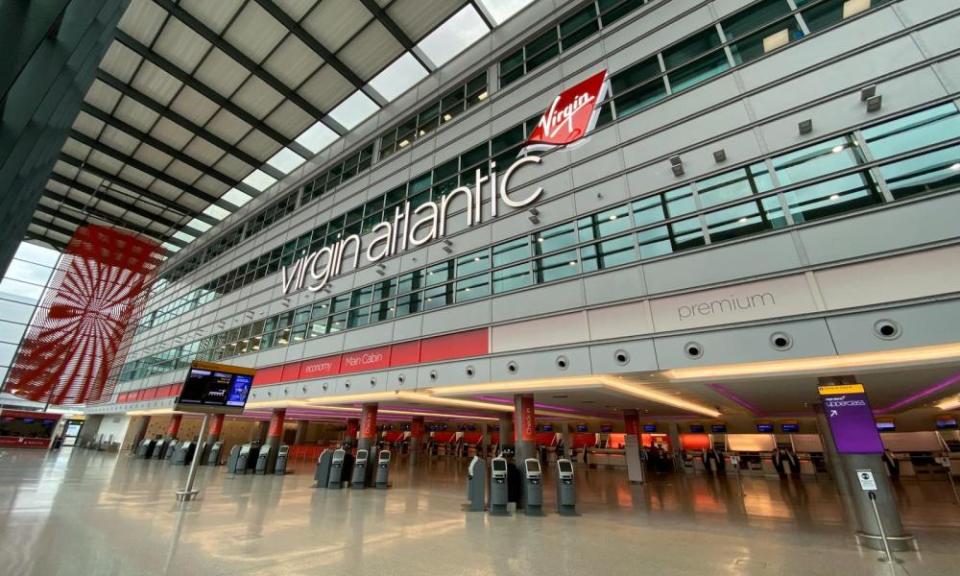Virgin Atlantic bailout backed by Rolls-Royce, Airbus and Heathrow

Virgin Atlantic’s quest for a state bailout has been backed by some of aviation’s biggest companies, with the aerospace giants Airbus and Rolls-Royce as well as Heathrow all lobbying the government on the airline’s behalf.
The trio have sent letters to the transport secretary, Grant Shapps, this week urging state assistance for Sir Richard Branson’s airline, which is seeking hundreds of millions of pounds in loans and credit guarantees with planes grounded and bookings vanishing because of coronavirus.
Virgin has ordered a fleet of Airbus 330 aircraft, with Rolls-Royce engines, whose wings are made at the Airbus Broughton plant in north Wales. The airline also had plans before the coronavirus to expand at London Heathrow.
In one of the letters, according to Sky News, John Harrison, the general counsel and UK chairman of Airbus, said that Virgin’s “collapse could have an extremely negative impact on the A330 programme”.
He added: “As you will be aware, all wings for these aircraft are designed and manufactured in the UK, and orders from airlines like Virgin are vital for the continuation of our business.”
Rolls-Royce has also stressed the “significant importance” of Virgin’s custom to the company and its UK supply chain.
A Heathrow spokesperson confirmed that the airport had written on Virgin’s behalf, and said: “The government must take urgent steps now to safeguard the future of the sector or it will risk undermining the recovery of Britain’s economy once we beat the virus.”
Virgin has parked up to 85% of its aircraft fleet and put most staff on eight weeks’ unpaid leave, as well as cutting executive pay, and offering redundancy and year-long sabbaticals to its 8,500 employees. The carrier is 51% owned by Branson’s Virgin Group, with a 49% stake held by the US carrier Delta Airlines. The US airline industry has already received a multibillion-dollar bailout as part of an economic stimulus package passed by Congress.
Virgin Atlantic’s chairman, Peter Norris, led calls last month for the government to give the industry up to £7.5bn in state support. However, the chancellor, Rishi Sunak, last week disappointed airlines and airports by deciding against an industry-wide bailout, but said help would be considered on a case-by-case basis.
Virgin submitted its claim for state assistance this week to Rothschild, the investment bank which is acting for the government to assess bailout requests from aviation businesses.
How much leverage Virgin’s industry backers have in Downing Street is questionable. Airbus was one of the most prominent industrial voices against Brexit, while Heathrow’s expansion plans have been left to evaporate by the government after a judicial review.
The government is also loth to be seen to be helping out billionaire shareholders. Branson has said he will inject $250m (£200m) into his Virgin Group, which includes other businesses as well as the airline. EasyJet, another major UK airline which could eventually require aid, went ahead with a £171m dividend payout this month, which it said it was legally obliged to do.
The regional carrier Loganair, which stepped in to take over some of Flybe’s routes when it collapsed at the start of the coronavirus outbreak, is also expected to seek help.
Help for Virgin would also be resisted by its bigger rival at Heathrow, British Airways, as well as environmental groups. Willie Walsh, the boss of BA’s owner, IAG, has said that “governments would expect airlines to look at self-help before they would call [for] state aid”.
Virgin Atlantic’s financial performance had been improving in recent years, cutting losses to £26m in 2018, the last full-year results the airline issued Its Virgin Holidays arm turned a slight £6m profit. The airline reported cash reserves of £489m a little under a year ago, and had since unveiled ambitious expansion plans to challenge BA’s dominance at Heathrow.
However, it is believed to have made significant additional losses in the ill-fated acquisition of Flybe, which – as part of a consortium – it hoped to rebrand as Virgin Connect, to feed passengers into its long-haul network. It owned 30% of the failed business and shareholders were said to have injected up to £100m into the business before Flybe’s collapse.

